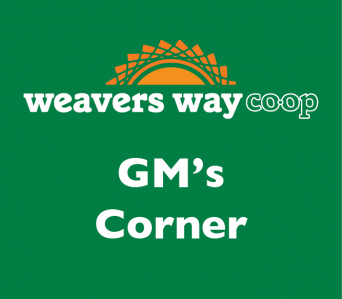
GM's Corner: We're Doing Our Best to Balance Our Triple Bottom Line
A couple of years back, I was asked to speak to a class of Temple University MBA students. After introducing myself, I clapped my hands together and proudly stated that I worked for Weavers Way Co-op, a “triple bottom line business.”
The puzzled expressions staring back at me made it clear I might as well have been speaking to them in ancient Greek.
Triple bottom line: People, Planet, Profit. Theoretically, this means all of our business decisions make good financial sense while also bettering our community and the environment.
In practice, our three bottom lines push and pull each other, and often business decisions benefit one at the expense of the others.
For example, the financial bottom line would almost certainly benefit if we sold conventional bananas alongside our organic, Fair Trade bananas. But conventional bananas are sprayed with some of the world’s most toxic pesticides, and conventional banana plantations have a long, sordid history when it comes to worker treatment. So in the case of bananas, the “community” bottom line (here broadly defined to include all of humankind) and the environmental bottom line carry the day.
But our environmental bottom line groans under the weight of all the plastic seltzer bottles we sell (more than 40,000 last year). Ceasing to sell plastic seltzer bottles would harm the financial bottom line in a way we cannot justify, not right now. So when it comes to seltzer water, the financial bottom line wins out.
Critics of the Co-op would say our inconsistencies amount to hypocrisy. I’d argue that while individual business decisions are often the result of an imperfect compromise, overall, we have worked hard to strike a careful balance that ensures the Co-op’s financial sustainability while also doing right for people and planet.
The tug of war between our three bottom lines ensures the Co-op is inherently a “center-left” organization. So yes, we want to eliminate all single-use plastic from our stores. But doing so will take time as we find reasonable alternatives. And yes, we want to get to a starting wage of $15 per hour. But we need to do so incrementally over several years. Progress tempered by practicality.
Those on the right easily dismiss us as a bunch of tree-hugging, granola-eating, Birkenstock-wearing hippies, labels that undoubtedly perplex those further on the left, including many of our most devoted members, who bemoan what they consider the Co-op’s slow pace when it comes to environmental and social change.
Put another way, it means a Hilary Clinton would make a better General Manager of Weavers Way than a Bernie Sanders. And while a guy like Mike Pence would never feel at home at the Co-op, an Andrea Merkel, or maybe even a Mitt Romney, might find some things about the place they like.
The conflict in our bottom lines is particularly relevant at the moment, as the Co-op continues to navigate through the Coronavirus pandemic.
A couple of months ago, I communicated to our Board of Directors that “our performance this year will be judged not on our profitability, but on how successful we are at maintaining the Co-op as a safe essential business.” In other words, we’re losing money. But it’s OK.
To meet our community bottom line, we must find a way to continue to keep the Co-op safe for both staff and customers. That’s meant things such as customer caps, extra labor for door monitoring, enhanced cleaning, and fulfilling more home delivery and curbside pickup requests, and extra pay — “Battle Pay” — for all front-line employees.
All of these efforts are, as you can imagine, not inexpensive, and therefore detrimental to the Co-op’s financial bottom line. Which means that right now, we’re in a period of what in government parlance would be referred to as “deficit spending,” dipping into cash reserves to cover the shortfall.
We’re well positioned to do so. Our cash reserves are strong, and they exist in part for exactly this sort of contingency. So for the time being, our community bottom line is in the driver’s seat. The financial and environmental bottom lines have been relegated to carping from the back.
In the end, the financial bottom line gets its revenge. Unlike the federal government, the Co-op, as a business, cannot choose to operate at a deficit indefinitely. We must maintain adequate cash reserves to ensure our long-term sustainability.
But for a little while, it’s more than OK to operate as we’re doing. If we operated strictly for profit, with shareholders insisting on their quarterly dividend, we’d be forced to make business decisions that might not necessarily be in the best interest of our customers and employees. No thanks. I’m glad we’re a triple bottom line business.
Now if we can only get them to teach this stuff in business school!
See you around the Co-op.
